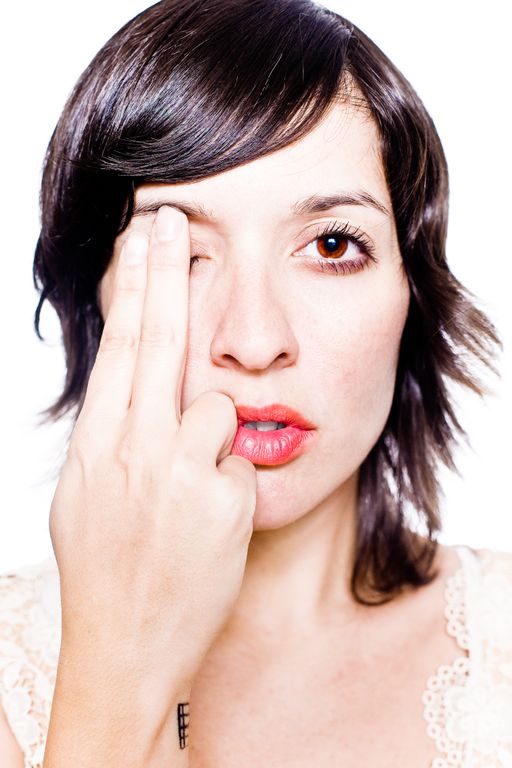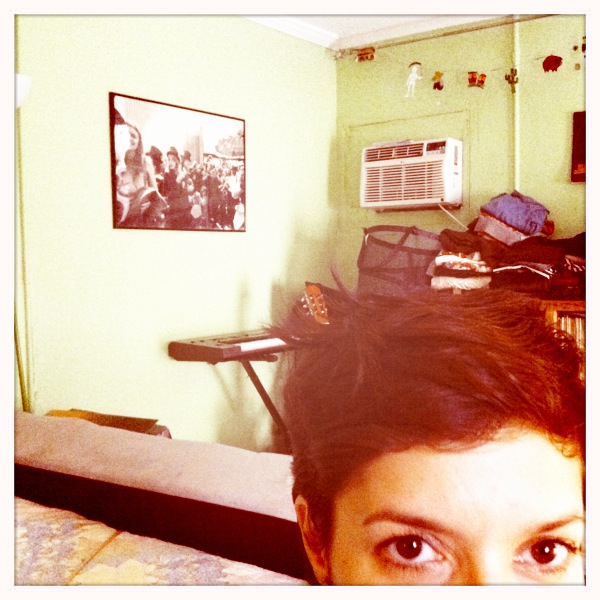“Time off is good, but the Christmas and New Year’s season is a little too long for my taste,” says singer-songwriter Tess Brunet. She’s about ready to get back to business, starting with a tour and then some recording later in the year.
Brunet (who plays Apothecary on Saturday, Jan. 19) has a music career that reads like a page from the truth or dare playbook — she left her adoptive home at age 17, moved to New York where got a job at S.I.R. Studios and taught herself to play drums on her breaks. After a mere six months of practice, she signed a record deal with Fat Possum (recording as Deadboy & the Elephantmen with Dax Riggs). Brunet also served as touring drummer for Asheville BFFs Generationals before going solo (as Au Ras Au Ras). She composed her 2008 debut on autoharp and her most recent album, darkly-dreamy The Great Nothing, on classical guitar. Which she’d been playing for less than a year, naturally.
It works. Henry Rollins included Au Ras Au Ras (pronounced “oh rah oh rah”) song “When The Night Arrives” on a radio show a couple of years ago (sandwiched between Curtis Mayfield and Tinariwen). Which, for a lesser artist, could be cause to freak out (both the Henry Rollins part and the placement on a playlist part). But Brunet is not a lesser artist. In advance of her Asheville appearance (her first with her own band), she talks to Xpress about plans, risks and therapeutic songwriting.

Mountain Xpress: What do you have in the works?
Tess Brunet: This year, at some point, where’s going to get back in the studio and do an EP.
Do you have a preference between doing EPs and full-lengths?
No, I just did the two full-lengths and I originally wanted the third to be a full-length, but I feel like if it’s a full-length, it’s more time and more money in the studio. As an independent artist that’s not really in my best interest, considering I’m the one who funds the tour. It’s really a lot to take on. [The EP] is kind of out of necessity. As an independent artist, you have to think of it in a much more business frame of mind that you would maybe like to. That’s the way it is. That’s OK.
You funded your first Au Ras Au Ras record through Kickstarter, but not the second. Why?
I felt very uncomfortable in the first place, the first go around. Some people present it in a way that’s like… I’m naturally uncomfortable. I think that comes across. I did well and I met my goal. That was great. But I barely made it. At the last hour a pledge put me over the top. I have mixed emotions about it — there’s a very clear divide among my peers who are for it or against it. I’m kind of somewhere in the middle. It’s basically like pre-ordering a record, way in advance, before it’s even made. I was in a better position the second time around. I was in a place where I could make the second record work, where the first one, I couldn’t at all. It was [Kickstarter] or wait another year or two to make the record I wanted to make and get into the studio I wanted to get into.
It’ll be interesting to see, in three or five years, where people are with crowd sourcing.
I know. It’s interesting. Even the difference of starting up a band in 2003 versus now is drastic. It’s weird, there’s still a mentality that hasn’t caught up, among the people on the business side operating within that world. It’s quite the contrast from seeming what’s on the outside, what’s taking place [versus] what’s happening on the inside, with the mindset, just in day-to-day operations.
You’re not only dealing with those changes, but you’ve taken on so many roles throughout your career. You started out as a drummer — did you always envision yourself fronting a band? Or did it just organically evolve that way?
I envisioned myself doing something. I love playing drums. I absolutely love it, and from the time I first started, to continuing to play now — I’ll be playing drums on one song, at least, coming up here on tour — I absolutely love playing drums.
But I was thinking about doing other stuff and playing other things. Singing, at least. Sort of more front and center. I had ideas about doing that very early on. And I was writing songs, sort of in private, when I was first developing whatever sense of songwriting. I never went to school for music or anything like that. I didn’t start playing until I was 25. I was completely self taught — I started writing my first songs on an autoharp. That’s really how it started. I knew I wanted to do some side project [but] it became more defined gradually, as time went on. It wasn’t something right out of the gate when I started playing drums. I didn’t even know where playing drums was going to take me, to be honest.
Photo from Robert Moreland Nola
Recording on autoharp, or on guitar even though you’d been playing for less than a year seems like a big risk. Did it seem that way to you?
It did. I also thought, maybe I’m not making the best album I could make. I [was] making the second record completely on guitar, which was totally a new instrument to me. But my though process was that I wanted to play something. I didn’t want to just stand there and sing. I’d written a couple of songs on the first record on guitar. I was messing around with that. I’d written a couple of songs on keys and a couple of songs on autoharp. I was faking on several different instruments. I even started off on drums on a couple of songs on the first record. I wasn’t focusing on any one instrument.
Autoharp, I’d tried to play that live and it had proven to be a real pain in the ass. It was all this technical stuff. I lost my patience with it very quickly from a live perspective. But the two songs I played guitar on, on the first record, really sparked something. Also, Bruce [Watson] who produced the first record was like, “I really think you should play guitar more.” I guess I was scared of something new: “I’m starting over. I’m trying to learn a whole different instrument after having been a drummer for a decade.” I thought I was crazy, but I decided I wanted to do this. So what if I hadn’t been playing very long? So I wrote the entire second album, on guitar. I showed [the songs] to the band. They came up with their parts. We payed in a room together and worked it out, and then we went into the studio.
We essentially recorded it live. There’s no overdubbing, there’s no going back and redoing the vocals. They’re either the first, second or third take of all the songs. My reasoning for doing that was, as much as you can sit in the studio and make your record better by doing it over and over, I just had very little interest in doing that. It was a challenge for me to force myself to get better. And I wanted it to translate live — I want to be a great live band.
I had the most fun on this last record that I’ve had on any record before. There was no stress, no pressure. We recorded and mixed the entire record in under a week. People don’t do that! I don’t think it’s something that the kids are into this days, but I don’t really give a damn!
Both Au Ras Au Ras albums have elements of darkness and white space. They’re kind of dreamy. Did you have any rituals to get into that mental or emotional space for writing or for recording?
It’s weird, I have to have all of my errands done and my house cleaned. Every loose end tied up before I can sit down in a space to create anything. Things have to be organized in the exterior and interior of my life. I can only be relaxed as long as everything else is done.
That’s in order to create. What happens in the way it comes out is natural. It’s an instinct for me. It comes from the bulk of my life. My childhood. Not really being close to my adopted folks and not knowing my biological parents really well. I know of them. All the things, the stories anybody has in their past. I think you can generally be a happy person but I think when you write about things you know and you feel, it can come across as sad. To me, [the songs are] really comforting. I hope it brings comfort and has a calming effect for other people. I don’t think they’re sad, but other people do. Just because it has that feel, doesn’t mean I’m that kind of person. It’s therapeutic — writing about what you feel.
It’s been awhile since you’ve been to Asheville. Have you ever been here with your solo project?
I’ve only ever played Asheville as a drummer in other projects. But we have a handful of really goof friends there. We didn’t get to tour the first record because I jumped from the first record right into — instead of touring, I had a enough money saved up to make the next record. So we went right into the studio and made the next record. Half the set will be from the first record and half the set will be from the second record. This is my first solo tour.





Before you comment
The comments section is here to provide a platform for civil dialogue on the issues we face together as a local community. Xpress is committed to offering this platform for all voices, but when the tone of the discussion gets nasty or strays off topic, we believe many people choose not to participate. Xpress editors are determined to moderate comments to ensure a constructive interchange is maintained. All comments judged not to be in keeping with the spirit of civil discourse will be removed and repeat violators will be banned. See here for our terms of service. Thank you for being part of this effort to promote respectful discussion.